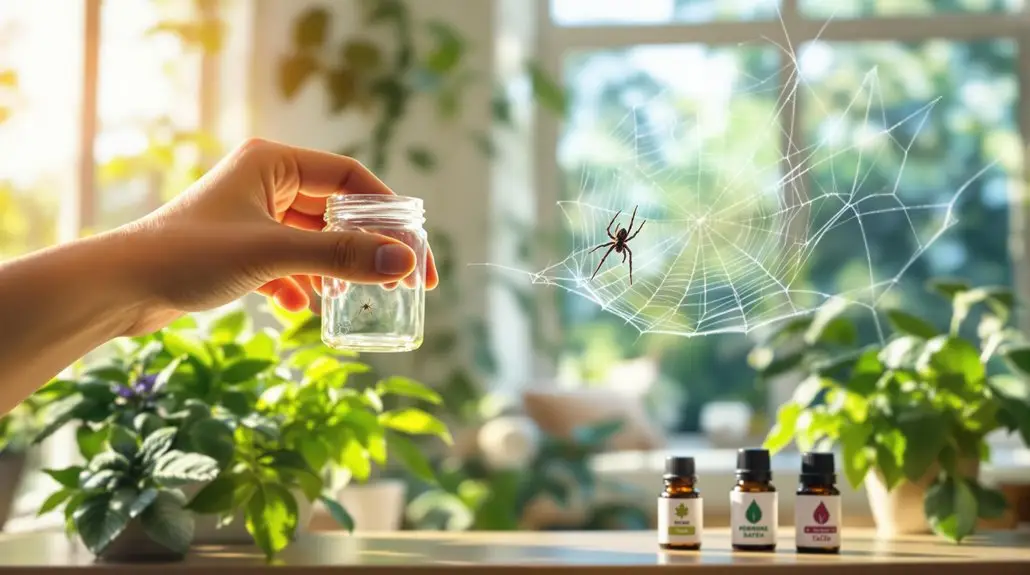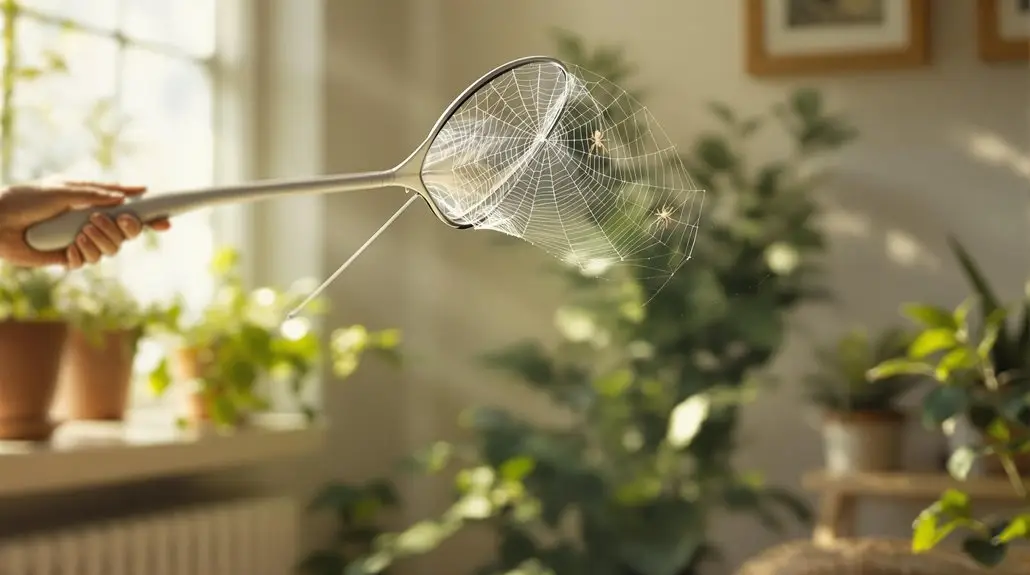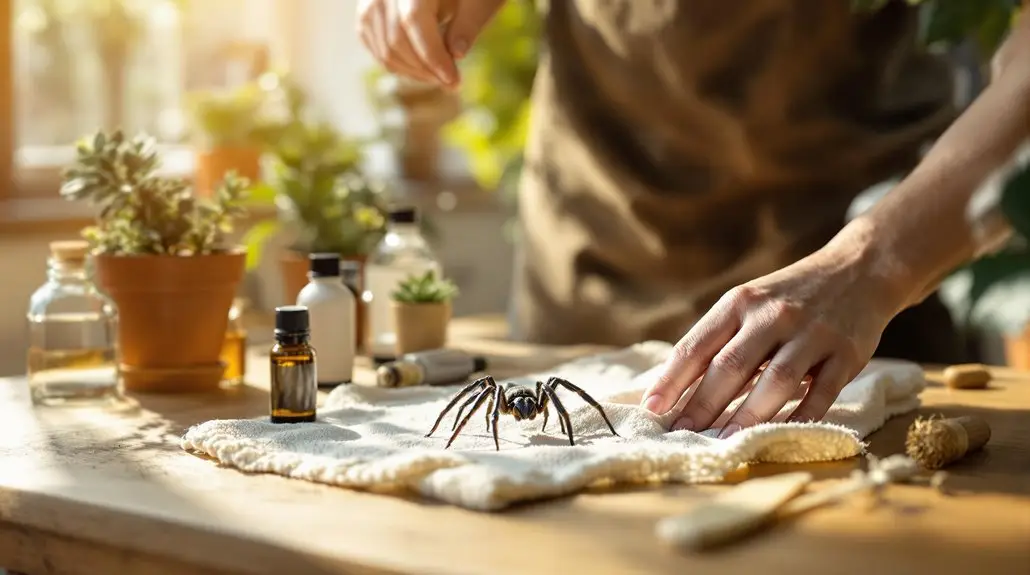To perform a natural spider removal service in Florida like a pro, start by regularly cleaning your home—dusting and vacuuming to eliminate webs and spider eggs. Next, seal entry points with caulk and weatherstripping to block their access. Use natural repellents like a vinegar and water spray or essential oils such as peppermint and citrus to create an unwelcoming environment. Remove spider webs immediately with a broom or vacuum and consider using spider catchers in infested areas. Maintain your garden by trimming overgrown plants. If you notice frequent sightings, you may want to explore additional strategies to keep spiders at bay.
Key Insights
- Start with thorough cleaning: dust, vacuum, and remove cobwebs to eliminate hiding spots for spiders.
- Seal entry points using caulk or weatherstripping to block gaps in windows, doors, and foundations.
- Use natural repellents like vinegar and essential oils (peppermint, tea tree) to deter spiders from entering.
- Employ spider catchers in high-activity areas to safely capture and release spiders away from your home.
- Regularly inspect your home for signs of spider activity, and maintain cleanliness to prevent infestations.
Importance of a Clean Home

Maintaining a clean home isn’t just about aesthetics; it’s essential for your health and wellbeing. A tidy space considerably improves indoor air quality, reducing the risk of allergies and breathing difficulties. When you sanitize common germ-harboring areas, you minimize the chances of falling ill. Plus, controlling allergens like pet hair and dust can make a world of difference for your comfort. Furthermore, ensuring a fresh air environment helps promote a healthier lifestyle for everyone in the household.
Additionally, effective pest control measures help prevent infestations that can compromise your home’s cleanliness and safety.
A clean environment doesn’t just benefit your physical health; it also boosts your mental health. You’ll find that a well-organized space helps lower stress and anxiety levels. When you eliminate clutter, you create an atmosphere where focus and productivity thrive. This sense of order fosters control, providing stability in chaotic moments. You might even notice that your mood lifts, thanks to the endorphins released in a clean setting.
Additionally, a clean home encourages healthier habits. An organized kitchen often leads to better food choices, while a tidy bedroom can enhance your sleep quality. These improvements contribute to a sense of belonging and peace, welcoming you home after a long day.
Socially, a clean home creates a warm and inviting atmosphere for family and friends, promoting harmony and connection. It also aids in maintaining a secure environment, free from clutter that could lead to accidents.
Sealing Entry Points
To keep spiders out, you first need to identify common entry points around your home. Check for gaps in windows, doors, and walls, as well as around utility lines. Once you spot these openings, you can use effective sealing techniques to close them off and protect your space. Ensuring that you seal visible cracks using caulk or weatherstripping is essential to preventing spider access.
Identify Common Entry Points
How can you effectively seal entry points to keep spiders out of your home? First, take a close look at the exterior. Check for gaps under doors, cracks around windows, and openings near utility lines.
Don’t forget foundation vents and the edges of your siding; these are often overlooked but can be vulnerable spots for spiders. In Florida, common pests such as spiders thrive in warm environments, making it essential to address entry points.
Next, consider your yard. Stacked firewood, debris, and overgrown shrubs can attract spiders. Trim back any vines or tree limbs that touch your house, as they can act like bridges for these critters. Keeping your yard tidy and removing fallen fruit will help reduce spider attractants. Additionally, placing crushed chestnuts at entry points can create a natural barrier against spider intrusion.
Indoors, focus on decluttering. Spiders love undisturbed areas, so regularly sort through your garage, shed, and attic, disposing of unwanted items.
Clean behind appliances and tackle closets to make these spaces less appealing to spiders.
Lastly, verify your windows and screens are in good shape. Tight-fitting screens and door sweeps can work wonders in preventing these unwanted guests from entering your home.
Effective Sealing Techniques
Sealing entry points is essential for keeping spiders out of your home. Start by inspecting doors and windows for gaps. Use caulk or weatherstripping to seal these areas effectively.
Don’t overlook cracks in your foundation, walls, or around vents and ducts—apply a quality sealant here as well. Check around pipes and electrical outlets, sealing any openings you find.
Next, focus on your exterior. Fill in cracks in brick or stone walls with a mortar mix. A silicone sealant bead around windows and doors guarantees a tight fit, while door sweeps or thresholds block gaps at the bottom.
Confirm your window screens are intact, free from holes or tears. Regular vacuuming and cleaning effectively remove spider webs, eggs, and spiders from corners and cracks.
Vents and ducts are other significant entry points. Clean out your ducted systems regularly and install vent covers or screens to keep spiders out.
Use duct sealant or tape for any gaps in the ductwork, and make sure all dryer and bathroom vents are properly covered.
Natural Spider Repellents

When it comes to keeping spiders at bay, natural repellents can be quite effective. You can use a simple vinegar and water spray, or explore the power of essential oils like peppermint and cedar. Certain natural oils also work well, making your home smell fresh while deterring those unwanted guests. Additionally, using integrated pest management (IPM) strategies can help create a sustainable environment that minimizes spider infestations.
Vinegar and Water Spray
A simple yet effective solution for repelling spiders is a vinegar and water spray. You can easily whip this up by mixing equal parts of white vinegar and water in a spray bottle.
White vinegar is particularly potent due to its high acetic acid content, but you can also use apple cider vinegar if that’s what you have on hand. For a more pleasant scent, try adding orange peels and letting the mixture infuse for a day.
When you’re ready to tackle those eight-legged intruders, spray the solution directly on the spiders, their webs, or in areas where they like to hang out, such as corners and windowsills. Direct application of the vinegar solution is essential for achieving maximum effectiveness against spiders.
Don’t forget to target those sneaky cracks and crevices in your walls and floors. Regular application is key for long-term effectiveness.
The acetic acid in vinegar dehydrates spiders, while its strong smell keeps them at bay. This natural remedy works wonders against smaller, web-building species like common house spiders.
Essential Oils Effectiveness
If vinegar and water sprays aren’t quite enough for your spider woes, essential oils can offer another natural solution. Essential oils like peppermint, lavender, eucalyptus, and tea tree are effective at repelling spiders while adding delightful scents to your home.
Peppermint oil, with its strong menthol aroma, disrupts spiders’ sensory organs, making your space undesirable. Just mix 10-15 drops with water in a spray bottle and target entry points like doors and windows. Additionally, using these oils as a natural deterrent enhances your overall spider control strategy.
Lavender oil, known for its soothing scent, can also deter spiders while creating a calming atmosphere. It’s a great choice for homes with young kids.
Eucalyptus oil has a fresh aroma that not only repels spiders but also invigorates your space. Finally, tea tree oil boasts powerful antiseptic properties that also make it an effective spider repellent.
Remember to reapply these sprays every 1-2 weeks to maintain their effectiveness. By incorporating essential oils into your spider prevention routine, you’ll create a welcoming, spider-free environment for you and your loved ones.
Citrus and Cedar Solutions
Citrus and cedar solutions offer effective, natural ways to keep spiders at bay in your home. By harnessing the power of citrus peels and cedar wood, you can create a welcoming environment free from unwanted eight-legged guests.
For citrus, gather lemon or orange peels, water, and a spray bottle. You can rub fresh peels along door frames, window sills, and corners or make a citrus spray by mixing peel extracts with water. Adding a few drops of dish soap helps with mixing and enhances the spray’s effectiveness. Citrus scents are known to repel spiders effectively, making them a great addition to your pest control arsenal.
Cedar solutions are equally powerful. Use cedar blocks, chips, or essential oil to deter spiders. Place cedar blocks in closets or under beds, and sprinkle cedar chips around doorways or in basements.
For a spray, mix cedar essential oil with water and apply it around windows and entry points.
Both citrus and cedar not only repel spiders but also infuse your home with fresh, pleasant scents. Remember to refresh these solutions regularly for best results.
Removing Spider Webs
When you notice spider webs in your home, it’s vital to act quickly to keep these eight-legged intruders at bay. Start by grabbing a broom or a vacuum cleaner. These tools are your best friends in the battle against spider webs. Focus on areas like ceilings, corners, and furniture where webs tend to accumulate. For those hard-to-reach spots, a vacuum with a hose attachment works wonders.
It’s important to remove webs as soon as you spot them. The longer you wait, the more likely spiders will set up camp in your home. A regular cleaning routine can greatly reduce web formation, so don’t forget to dust and clean surfaces frequently. It’s all about maintaining an inviting space for you, not spiders! Additionally, most spiders prefer dark, quiet areas in homes, so focus on those spots during your cleaning.
Furthermore, consider using natural sprays to deter future web formation. A simple mixture of white vinegar and water in a spray bottle can be an effective repellent. You can also enhance this mix with essential oils like peppermint or lavender. Spray these solutions around your home, especially in areas where you often find webs.
Lastly, keep your environment clean and clutter-free. Remove cardboard boxes and other clutter that provide hiding spots for spiders. By regularly taking out recycling and keeping your outdoor spaces tidy, you’ll create a welcoming atmosphere for you and your loved ones, while keeping spiders at bay.
Using Spider Catchers

For effective spider removal in your home, using spider catchers can be a game-changer. First, start by identifying the spider species you’re dealing with. This helps you choose the right catcher that’s secure for indoor use and efficient for those specific spiders.
Once you’ve got your catchers, place them strategically in areas where spiders are most active, like corners, closets, and near food sources. Just be sure to keep them out of reach of kids and pets.
When using spider catchers outdoors, inspect areas like eaves, attics, and under porches for spider activity. Position catchers near shrubs, awnings, and around exterior lights for the best results. Opt for weather-resistant options to guarantee they hold up against the elements. Understanding spider behavior can help you determine the best times to check your catchers for captured spiders.
Remember, catchers work best when combined with other methods, like sealing entry points. Regular maintenance is key. Check your catchers frequently to remove any captured spiders and clean or replace them as needed.
Whether you go for glue traps, handheld catchers, or even DIY options, make sure they’re efficient for the spider species you’re targeting. While spider catchers can greatly help manage spider populations, they’re most effective as part of a broader spider control plan.
Effective Pantry Staples
After tackling spider issues with effective catchers, it’s time to focus on another important aspect of maintaining a comfortable home: stocking your pantry with staples that keep you prepared for any meal. A well-stocked pantry not only simplifies cooking but also fosters a sense of community as you share meals with family and friends.
Start with dry goods like rolled oats, quinoa, and various types of rice. These versatile staples can serve as a base for numerous dishes. Pasta, whether it’s whole grain or lentil, adds heartiness to your meals.
Don’t forget dried beans like black, kidney, and cannellini; they’re excellent sources of protein and can be easily prepared in soups or salads.
Next, consider your cooking oils and condiments. Avocado oil and extra virgin olive oil are perfect for sautéing or salad dressings, while a selection of vinegars—apple cider, balsamic, and red wine—can elevate your dishes with new flavors.
Nuts and seeds aren’t just great for snacking; they also add texture and nutrition to meals. Stock up on nut butters like peanut or almond, and include seeds like flax and chia for added health benefits.
Finally, keep baking and snacking essentials on hand. Whole grain cereals and dried fruits make for nutritious breakfasts or snacks.
Crackers, like Simple Mills or rice crackers, can complement any gathering.
With these effective pantry staples, you’ll always be ready to whip up something delicious and invite others to share in the joy of good food.
Creating Unwelcoming Environments

Creating an unwelcoming environment for spiders starts with maintaining a clean and clutter-free home. Regular dusting helps eliminate cobwebs and possible hiding spots, making your space less inviting.
Replace cardboard boxes with plastic storage tubs to give those eight-legged visitors fewer places to hide and thrive. Clear away clutter, like piles of recycling or boxes, and keep firewood neatly stored outside. Regular vacuuming not only tidies up but also prevents mess buildup, which can attract spiders.
Next, focus on sealing entry points. Inspect your home for gaps and cracks around doors and windows, as these can be easy access points for spiders. Use caulk or weatherstripping to seal small openings, and ascertain your screens are intact.
Don’t forget to check the floorboards and baseboards for any cracks that might let them in.
You can also turn to natural repellents. A simple vinegar and water spray around entry points can deter spiders, while essential oils like peppermint or tea tree work wonders too.
Citrus peels placed on thresholds and windowsills add an extra layer of protection.
Maintaining Your Garden
To keep your garden spider-free, regular pruning is essential to reduce potential hiding spots.
You should also consider planting spider-repellent plants like eucalyptus or lavender, which can create a natural barrier against these pests.
Regular Pruning Techniques
Pruning your garden regularly not only enhances its appearance but also plays an essential role in deterring spiders and other pests. By trimming and pruning trees and shrubs, you reduce shading and moisture retention, creating an environment less inviting to these critters.
Make it a habit to keep your garden free of debris, like dead leaves and branches, as they can attract unwanted visitors.
Proper drainage is key; guarantee your garden doesn’t have waterlogged areas where spiders thrive. Maintaining a neat and tidy space by removing weeds and overgrown vegetation will also discourage pests.
Consider using mulch that’s less appealing to spiders, such as gravel or wood chips.
For your lawn and ground cover, mow regularly to minimize hiding spots. Avoid overwatering, and use a lawn aerator to boost air circulation and reduce moisture.
Eliminate piles of wood or rocks that can serve as spider habitats, and edge your lawn to prevent overgrowth into garden beds. Additionally, incorporating environmentally friendly solutions into your pest management strategy can further enhance your garden’s defenses against unwanted pests.
Choosing Spider-Repellent Plants
Your garden can be an effective barrier against spiders by incorporating specific plants known for their repellent properties. Start with strong-smelling herbs like basil, rosemary, and mint. These not only deter spiders but also add vibrant flavors to your cooking. Plant them in sunny spots or pots, so you can enjoy their scents indoors too.
Consider adding colorful flowers like marigolds and lavender. Marigolds release a natural toxin that repels spiders, while the scent of lavender is unpleasant to them. You can create a stunning display that also keeps your space spider-free.
For larger plants, eucalyptus and citronella grass are excellent choices. Their strong scents can be strategically placed near entry points to keep spiders at bay. Additionally, using natural pest control methods can enhance your garden’s ability to deter not just spiders, but other pests as well.
Remember to maintain your plants by ensuring they receive adequate sunlight and well-draining soil. Regular deadheading of blooms, like lavender, will help sustain their repellent effects.
Regular Cleaning Habits

A clean home is your best defense against spiders, as regular cleaning habits can greatly reduce their presence. By establishing a routine, you create an environment that’s less inviting for these eight-legged intruders. Here are some key cleaning practices to take into account:
- Dust your home frequently to eliminate potential hiding spots.
- Vacuum regularly to rid the house of unwanted webs and spider eggs.
- Use a damp cloth to wipe down surfaces, especially in spider-prone areas.
- Declutter to reduce hiding spots and make your space more inviting.
Start by dusting all surfaces, including corners and behind furniture. Regular vacuuming helps remove spider webs and eggs that might be lurking in unseen spaces.
Make sure to use a damp cloth afterward to wipe down surfaces, as this prevents dust from settling back down.
Clearing out clutter is essential, too. Piles of boxes or firewood can become cozy homes for spiders. Replace cardboard boxes with plastic storage tubs to deter nesting, and organize your storage areas for easy access and cleanliness.
Don’t forget to remove spider webs whenever you see them. Use a broom or vacuum to clear out cobwebs and spray areas where cobwebs form with natural repellents like vinegar or essential oils.
When to Seek Professionals
When spider sightings become frequent and webs start appearing in multiple rooms, it’s time to contemplate seeking professional help. If you notice an increase in daily spider sightings, or if you find spider droppings—small, dark spots on your floors—it’s a clear sign that your home might be experiencing an excessive infestation. Spotting egg sacs in various areas is another red flag, indicating that spiders are breeding right under your nose.
If you identify black widows or brown recluses, don’t hesitate to call in the experts. These venomous spiders pose serious risks, especially if you have small children or pets in the house. Severe spider bites can lead to painful symptoms, and an influx of these dangerous species calls for immediate action.
When you start to see large numbers of spiders and excessive webs, and your DIY methods fail to control the situation, it’s time to admit that professional intervention is crucial. Rapid population growth from even a single breeding pair can quickly overwhelm your home, leading to structural damage and aesthetic issues that can affect your peace of mind.
A professional inspection can help identify entry points and spider activity, employing specialized products not available to the public. With customized treatment plans and follow-up visits, you’ll be able to regain control of your space and guarantee it remains spider-free.
Don’t let spiders take over—seek help when the signs become too overwhelming.
Long-Term Prevention Strategies

After addressing an infestation with professional help, maintaining a spider-free environment hinges on implementing long-term prevention strategies. You want your home to feel welcoming and secure, not like a spider’s playground.
Adopting a proactive approach can make all the difference, ensuring you and your loved ones can enjoy your space without unwelcome guests.
Here are some effective strategies to help you maintain a spider-free home:
- Keep your space clean: Regularly dust and vacuum to eliminate cobwebs and dust accumulation. Replace cardboard boxes with plastic storage tubs to reduce hiding spots.
- Seal entry points: Inspect your home for gaps and cracks, sealing them to prevent spider entry. This simple step can greatly reduce their chances of getting inside.
- Utilize natural repellents: Essential oils like peppermint and lavender can repel spiders. Mixing white vinegar with water and spraying it around your home also works wonders.
- Create barriers: Sprinkle salt at entry points to create a dehydrating barrier. You can also use diatomaceous earth, which effectively dehydrates and kills spiders.
Frequently Asked Questions
What Are the Safest Methods for Handling Venomous Spiders?
When you encounter a venomous spider, stay calm and avoid sudden movements.
Back away slowly, giving the spider space to retreat. Don’t try to handle or provoke it—your well-being’s the priority.
If you need to remove it, consider using a jar and a piece of paper to gently trap and release it outside, far from your home.
Always wear protective clothing and gloves, and seek professional help if you’re unsure.
How Can I Identify Different Types of Spiders in My Home?
Identifying different types of spiders in your home can feel like a high-stakes detective mission!
Start by observing their size, color, and web style. For instance, the American House Spider is small and gray with messy webs, while Wolf Spiders are large and hairier, prowling actively.
Look for their hiding spots—corners, basements, or attics. Knowing these details makes you part of a community of informed homeowners, ready to tackle your eight-legged guests!
Are There Any Specific Plants That Repel All Spider Species?
While no specific plant can repel all spider species, certain plants can help reduce their presence.
Eucalyptus, peppermint, and citrus plants are known to deter spiders effectively. You can grow eucalyptus in your garden or use peppermint oil mixed with water as a spray around your home.
Citrus peels also work well when placed near entry points. Incorporating these plants and oils into your space creates a more welcoming and spider-free environment.
How Often Should I Perform Spider Removal Maintenance?
You should perform spider removal maintenance every 1-2 months to keep your home spider-free.
Regular inspections let you spot webs and egg sacs early, while vacuuming removes any lingering spiders.
Don’t forget to seal entry points and declutter to make your space less inviting.
Can Natural Repellents Harm Pets or Children?
Yes, natural repellents can potentially harm pets or children if not used properly.
Essential oils might be toxic if ingested or applied in high concentrations, so it’s best to keep them out of reach.
Vinegar is generally harmless but can irritate skin and eyes.
Always supervise kids and pets around these substances, and use diluted solutions.
Weave a Spider-Free Sanctuary: Trust NaturePest Holistic Pest Control to Protect Your Home!
By embracing these natural spider removal methods, you’re not just clearing your space; you’re weaving a protective web around your South Florida home. Picture your sanctuary, free from creepy-crawlies, where peace reigns supreme. With a little diligence, you’ll create an inviting environment that keeps spiders at bay. Remember, a clean home is like a well-tended garden—nurtured and flourishing. So roll up your sleeves and take control, because a spider-free haven is just within your reach!
For expert guidance and effective solutions, trust NaturePest Holistic Pest Control to help you maintain your spider-free sanctuary. Don’t wait—contact us today to learn more about our natural pest control services and take the first step towards a peaceful, spider-free home!



